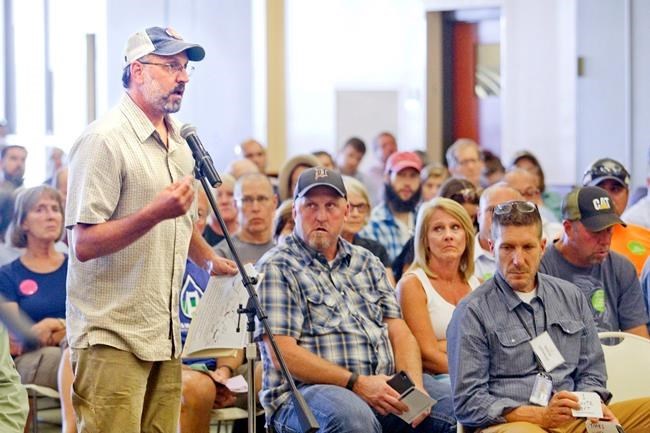
Christopher Grobbel, of Grobbel Environmental and Planning Associates, speaks during feedback session on Enbridge Inc.'s Line 5 at the Hagerty Center on the Great Lakes Campus of Northwestern Michigan College in Traverse City, Mich., Monday, July 24, 2017. Supporters and opponents of twin oil pipelines beneath the Straits of Mackinac are making their cases in a series of public meetings. (Jan-Michael/Traverse City Record-Eagle via AP)
Republished July 24, 2017 - 9:40 PM
Original Publication Date July 24, 2017 - 8:21 AM
TRAVERSE CITY, Mich. - An engineering company's report on the future of twin oil pipelines beneath the Straits of Mackinac is flawed and biased in favour of continuing the existing system, critics said Monday. A business coalition said keeping oil flowing through the 64-year-old pipes is essential to Michigan's economy.
Supporters and opponents of Enbridge Inc.'s Line 5 made their cases as officials convened a series of public feedback sessions on a draft analysis performed for the state of Michigan. The report submitted in June by Dynamic Risk Assessment Systems Inc. outlined six alternatives for the line, which transports about 23 million gallons daily between Superior, Wisconsin, and Sarnia, Ontario. A nearly 5-mile-long (8-kilometre) segment divides into two pipes at the bottom of the waterway connecting Lakes Huron and Michigan.
"The report is unreliable and should not be used," said Liz Kirkwood, executive director of For Love of Water, an environmental advocacy group that wants the underwater portion of Line 5 decommissioned. "Instead, the state should protect the Great Lakes from the potential of a catastrophic oil spill and exercise its legal authority to revoke Enbridge's permission to use the waters and lakebed that belong to the people of Michigan."
Dynamic Risk Assessment Systems is based in the Canadian city of Calgary, Alberta — as is Enbridge, which paid for the study although the state requested it. State officials and representatives of the engineering company were hosting public discussions of the draft Monday in Holt and Traverse City and Tuesday in St. Ignace. A final version is due this fall.
Protesters demanding the shutdown of Line 5 waved placards at passing cars before the Traverse City session, which drew more than 300 people to Northwestern Michigan College on the shore of Lake Michigan's Grand Traverse Bay.
"The thought of oil bubbling up in this beautiful lake is more than I can bear," local resident Barbara Schneider said. "We can't eat oil, we can't drink oil and water is life."
Rob Kitchen, an Enbridge area supervisor from Okemos, said the Canadian company employs Michigan residents who also love the Great Lakes.
"We're Michigan people working every day like everybody else to make sure Line 5 is safe," he said.
Kirkwood said the draft's six options did not include diverting Line 5's oil to other pipelines in service. It downplayed the likelihood of an eventual pipeline failure and used a best-case scenario to estimate potential damage to shorelines and the economy, she said. And it assumed no reduction could be made in the volume of oil and liquid natural gas the line carries.
Ed Timm, a retired Dow Chemical Co. engineer and Line 5 opponent, said the report also glosses over bends in the lines that could signal damage caused by strong currents and erosion of sediment beneath the pipes.
Enbridge spokesman Ryan Duffy said the bends reflect natural drop-offs in the lake floor's elevation that the pipeline was designed to accommodate. The company is seeking state permission to install 22 additional supports for the line, including five in a 200-foot sloping area.
"We have tested the pipe and have not found any integrity issue anywhere," Duffy said.
Several business organizations, including the Michigan Chamber of Commerce and representatives of manufacturers and energy suppliers, said the Dynamic Risk Assessment Systems study provided more evidence that Line 5 should stay in operation.
"The fact is that pipelines are proven to be the safest, smartest way to transport energy," said Erin McDonough, president of the Michigan Oil and Gas Association. "They reduce risk by moving product off roads and rails that run through the hearts of Michigan communities. We need Line 5 to remain in service, and we need it independently inspected, diligently maintained and operated safely."
___
Follow John Flesher on Twitter at http://twitter.com/JohnFlesher
News from © The Associated Press, 2017